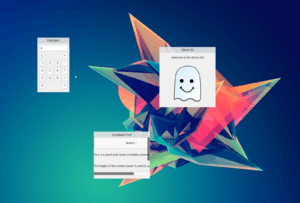Ghost (operating system)
Ghost OS is an open-source[1] hobby operating system and kernel. It is under development since 2014[2] and currently compatible with the x86 platform.
 | |
| Developer | Max Schlüssel |
|---|---|
| Working state | Alpha |
| Source model | Open source |
| Initial release | 2014 |
| Latest preview | 0.5.6b / December 17, 2018 |
| Repository | |
| Marketing target | Personal computer |
| Platforms | IA-32 |
| Kernel type | Micro kernel |
| License | GPLv3 |
| Official website | ghostkernel |
The system is based on a microkernel and features symmetric multi-processing and multitasking. Most of the kernel and system programs are written in C++.
Design
The architectural concept is a micro-kernel design. Many of the functionalities that are usually integrated in the kernel in a monolithic or hybrid system are implemented as user-level applications. Drivers and some vital components (like the executable loader) are running as such processes. This approach tries to improve stability and avoid crashes due to faulty accesses, hardware uses or memory corruption.
There is a userspace spawner process used to load executables. The current implementation supports static 32-bit ELF binaries. Dynamic linking is not supported yet.
The kernel provides an application programming interface that is used for all inter-process communications and system commands. Driver processes access this interface to manage memory or request direct resource access. The interface functions are C-compatible.
Library support
A custom implementation of the libc is provided. This implementation incorporates the libm from the musl C library. libstdc++ is available as a default part when setting up the Ghost specific compiler toolchain.
POSIX compatibility
The system is partially POSIX.1 compatible. This was introduced to allow porting of third-party software, especially from the GNU environment, which heavily depend on standard C and POSIX functions.
See also
- ToaruOS – hobby operating system by K. Lange
References
- "Sources, released on GitHub". GitHub. Retrieved 2016-07-28.
- "First public demo release of version 0.3.0, OSDev forums". forum.osdev.org. Retrieved 2016-07-28.